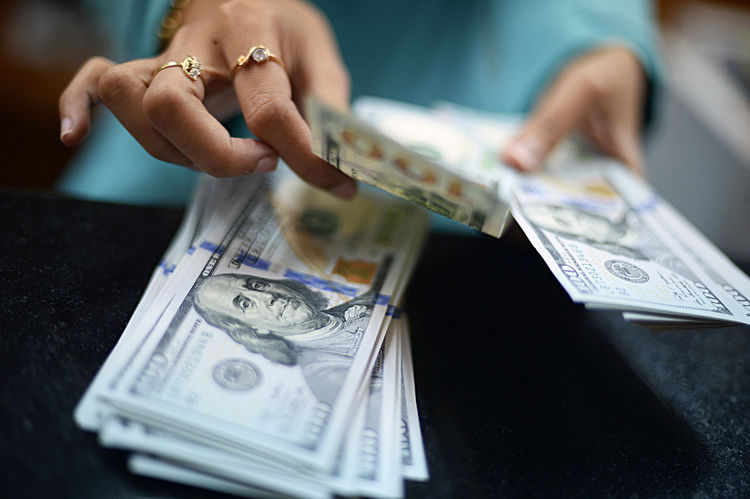- Black Market Is Cheaper Than Official Naira Rate
Nigeria’s new currency market is showing just how severe the country’s dollar shortage is.
The naira is falling to levels weaker than the black-market rate in a foreign-exchange window set up for international investors and hedge funds last month. It’s a signal of how dysfunctional currency markets have become in Africa’s largest economy amid multiple exchange rates and a host of trading and import restrictions.
Funds including Chicago-based Frontaura Capital, South Africa’s Allan Gray Ltd. and Duet Asset Management Ltd. of London have bought and sold the currency at levels as much as 6 percent weaker than where it trades in back-alley shops.
The exchange window for portfolio investors was set up by the central bank April 24 to ease a crippling scarcity of hard currency by allowing the naira’s value to drop beyond its official rate. While investors welcomed the move, there’s still a shortage of dollars amid persistent concerns that the monetary authority, which backtracked on a pledge to float the currency last year, will manipulate the rate within the window.
“Dollar liquidity is still very tight,” said Ayodele Salami, who manages about $450 million of African stocks as Duet’s chief investment officer. “The central bank has not provided that much foreign exchange in the window. People won’t come in to Nigeria until they know they can get out. It’s a chicken-and-egg situation. The market’s not yet that functional.”
He managed to sell less than $1 million of naira last week at 396 per dollar, which compares with the black-market rate of 391 and the official interbank rate of 315. The black market is typically used by individuals and small businesses for transactions of less than a few thousand dollars in cash. Access to the interbank market is tightly controlled as part of the government’s efforts to keep a lid on inflation, which accelerated this year to 19 percent, the highest level in at least a decade.
‘Some Kinks’
Frontaura, a hedge fund with $120 million of assets, was able to buy a few hundred thousand dollars last week at rates of between 414 and 399 as it sought to repatriate dividends.
The new market “has some kinks to work out,” said Tom Egbert, an analyst at Frontaura. “But at least you can trade naira for dollars. There’s a chance in the coming months that this new FX window leads to a properly functioning FX market.”
Cape Town-based Allan Gray, the largest manager of non-government investment funds in Africa, got a rate of around 405 for dollars it sold to buy Nigerian T-bills yielding as much as 22 percent.
“We’ve been pleasantly surprised at the levels we’ve managed to get,” said Nick Ndiritu, a money manager who helps oversee the $276 million Allan Gray Africa ex-SA Bond Fund.
Tempting Aberdeen
The introduction of the window has tempted Aberdeen Asset Management Plc, which manages about $11 billion of emerging-market assets from London, to buy naira bonds for the first time in about two years. It sold all its local-currency debt in 2015 when Nigeria tried to prevent the naira from weakening amid the crash in the price of oil, its main export.
“We’re talking to banks to re-initiate a small position in the local market,” Kevin Daly, a money manager at Aberdeen, said May 5. “I’m confident we could get something around 400. It seems there is some semblance of a two-way market returning, albeit a small one.”
The new window has a fixing rate, known as NAFEX, which is published once a day. It fell to 378.87 per dollar on Monday, its lowest yet.
BlackRock Inc. switched to using NAFEX on April 24 for valuing naira holdings in its iShares exchange-traded fund that tracks the MSCI Frontier Markets Index, while Allan Gray did the same for its $254 million Africa ex-SA Equity Fund at the end of the month, signaling that investors increasingly view the main interbank rate as irrelevant.
“The new central bank policy’s made it clear that foreign investors now have to go to the NAFEX market,” Salami said. “You’re never going to get the interbank rate.”

 Forex3 weeks ago
Forex3 weeks ago


 Naira2 weeks ago
Naira2 weeks ago
 Billionaire Watch2 weeks ago
Billionaire Watch2 weeks ago




 Naira2 weeks ago
Naira2 weeks ago




 Naira2 weeks ago
Naira2 weeks ago




 Naira1 week ago
Naira1 week ago




 Naira3 weeks ago
Naira3 weeks ago




 Naira4 weeks ago
Naira4 weeks ago






















